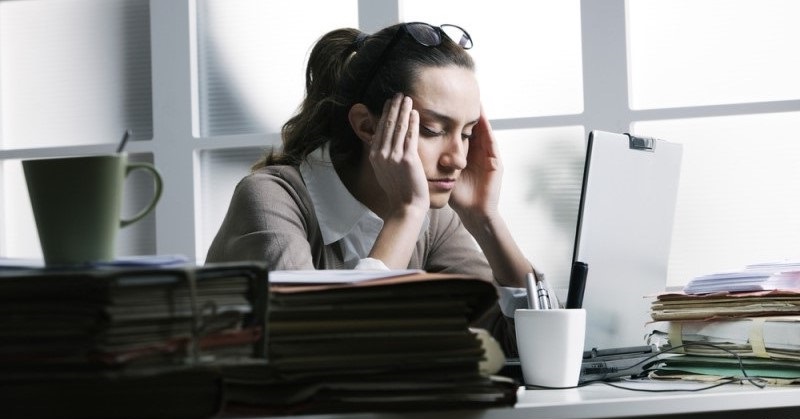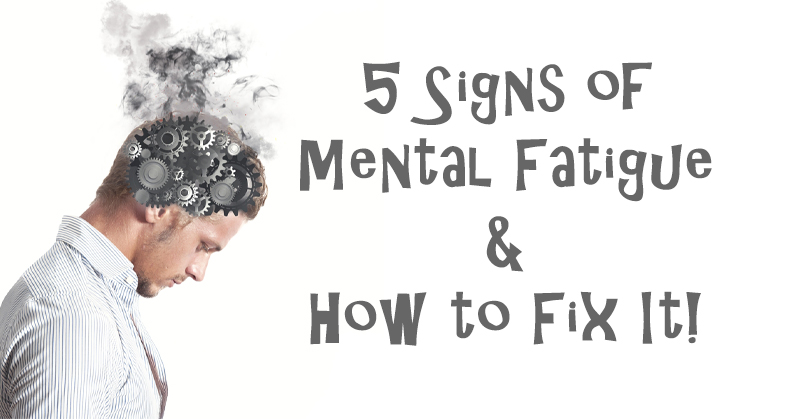When your stress level has been elevated and you feel weighed down, you could be experiencing mental fatigue. Spending long periods of time in a hectic environment or feeling constant anxiety can affect more than just your physical being. The brain controls the body, so mental fatigue can become serious. Here are five signs of mental fatigue along with ways you can fight it.
1. There’s Too Much Going On
Feeling overwhelmed is one thing, but when you become aware of the sounds, smells, sights, mental activity and physical movement surrounding you, it’s a sign that you’ve gone past the feeling of being overwhelmed. There’s too much going on around you to be able to focus or get anything done, and it’s extremely uncomfortable. Too much data coming from all of your senses can cause mental fatigue.
Try this: Shut off the devices that you can control, like music, a fan, the television or lights that are flickering. Get rid of anything that is distracting you that you don’t need, and try to focus on one thing. If someone is talking to you, turn toward them and make eye contact to give them your full attention, and forget trying to multi-task for a while.
2. You’re Always Busy
If you can’t remember the last time you sat down and read a good book, took a bubble bath, walked through a park or just relaxed, it’s a sign that you’ve been on the go for too long. Taking time for yourself is completely necessary in order to unwind and give your brain a rest. Constantly working, moving and taking care of others can put stress on your mind and body.
Try this: Do your best to free up your calendar a little. Just because you have a free day doesn’t mean you need to plan something. Saying no or asking a friend to reschedule is perfectly okay. Spending time alone is the best way to relax and de-stress. Try to give yourself time each day to do something you love. If you have a whole day free, even better. Relax on the beach, go for a hike, treat yourself to a spa day, or spend the whole day in your pajamas! Do whatever makes you happy and allows you to relax.
3. You’re Feeling More Emotional
Anxiety and even depression can be symptoms of mental fatigue. If you’re feeling hopeless or constantly anxious, it’s a sign that your mental energy is low. Your emotions may be all over the place. You might find yourself crying or getting angry for no reason.
Try this: Pinpoint what is causing your mental fatigue. Is it a job, a person or a life situation? While some things may be out of your control, do what you can to remedy the problem. Making a change may be the only way to relieve your anxiety and calm your mind.
4. You’re Experiencing Physical Symptoms
Mental fatigue can often manifest as physical problems. Headaches, a repeatedly upset stomach, loss of appetite and insomnia can all be signs of mental fatigue. Your mental health isn’t the only thing being affected.
Try this: If you’re experiencing severe physical symptoms, consult a health care professional. Some downtime is the best way to relieve mental fatigue, but if you need help managing your stress and anxiety, consider visiting a therapist.
5. You Have a Mental Block
If you’re experiencing a mental block, it’s a sign that you’ve been so mentally drained that it’s affecting your ability to think, process information and make decisions. If your work, home life, happiness or creativity is beginning to suffer, it’s time to do something about it.
Try this: Researchers studying mental fatigue found that mental blocking, or an inability to continue a train of thought, acts as an automatic safeguard to prevent an individual from continuing to work. When mental blocking kicks in, your brain is desperately trying to tell you to slow down. Shut off your electronics and take a much-needed day off to relax and give your mind a break.
https://youtu.be/1Yp1yk9RvRA


